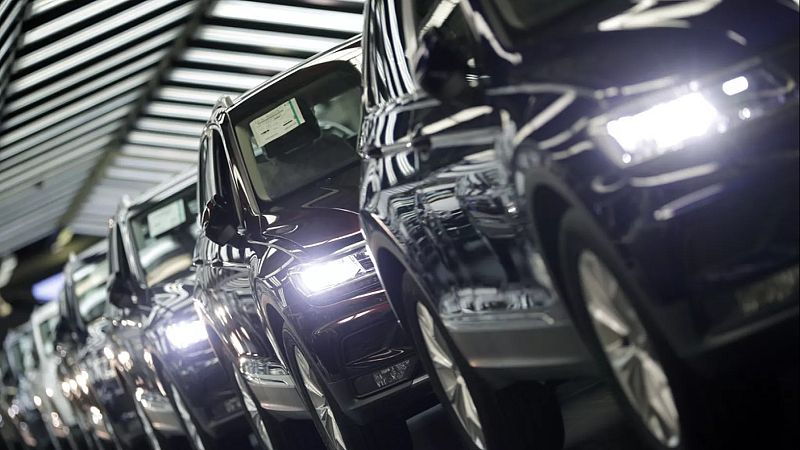
Reports of paused shipments, urgent dialogues with policymakers, and stock markets in limbo. The European car industry faces a fundamental turning point in trade policy after US President Donald Trump announced his new levies, including a 25% tariff on cars.
German car manufacturers are particularly hard-hit by the tariffs, as the country is the EU’s leading car exporter, accounting for nearly 65% of the bloc’s auto exports.
“The new US tariffs pose a serious threat to globally integrated industries with complex supply chains such as the automotive sector,” Dr. Sonali Chowdry, Research Associate at the German Institute for Economic Research (DIW) told Euronews Business.
The president of the German Association of the Automotive Industry (VDA) Hildegard Müller called the tariffs a form of “protectionism” that “will have negative effects on economic growth worldwide” and “affect jobs”.
Tariffs are expected to trigger higher prices primarily in the US, resulting in lower demand that would affect the whole supply chain and operations elsewhere, including in Europe.
Stock markets across the globe have been in limbo for days, and major European carmakers' share prices took severe hits after Trump’s tariffs were initially announced. Volkswagen (VW), BMW and Mercedes have each lost between 6-8% of their value over the last five days.
“The ongoing volatility of global markets is only increasing trade barriers and costs for businesses,” Sigrid de Vries, Director General of The European Automobile Manufacturers Association (ACEA) said in a statement, urging the European Commission to find a common ground with the US and avoid countermeasures that could damage European competitiveness.
“Tariffs do nothing but raise prices for consumers across Europe, the United States, and the wider world,” Chowdry said.
The European Commission is in negotiations with the US, suggesting earlier this week that tariffs could be lowered on both sides of the Atlantic in a zero-for-zero deal.
What is the cost for major German car manufacturers?
Over a fifth of EU vehicle exports go to the US, almost 760,000 new vehicles, valued at €38.9 billion in 2024. Two-thirds of that total comes from Germany.
About a quarter of German auto exports to the US are cars shipped by German firms to their own American subsidiaries.
“Disruptions to these within-company trade flows harm EU exports as well as operations of these businesses in the US,” Chowdry said.
Meanwhile, European companies also produce locally, or closer to the US market, for instance, in Mexico.
Some of them have already made moves in response to Trump’s tariffs, including Stellantis, which announced a temporary halt in production in Mexico and Canada.
The firm also announced temporary job cuts in the United States as it reassesses future revenues. Jaguar Land Rover decided to pause shipments while sizing up the effects of the tariffs.
How the VW Group is assessing the situation
The Volkswagen Group, the world’s second biggest car manufacturer after Toyota, said that they are internally assessing the potential impact of the tariffs.
The company is one of several German car manufacturers facing a choice: either cut profit margins and raise prices, or boost production in the US. Alternatively, firms could pause shipments to the US altogether—as Jaguar Land Rover has done with its UK-made cars.
VW, including brands such as Porsche, Škoda and Audi, has not commented on news reports claiming that Audi car deliveries have been suspended to the US. No Audi models are manufactured in the country.
Volkswagen, already having 6 production sites in the US, has nonetheless been eyeing the US market for further expansion. Before Trump’s tariff news broke, it referred to North America as the market with “the greatest growth potential”.
VW has invested more than $14bn (€12.8bn) into the US market recently, and 7% of their global workforce is employed in the country.
The company sold a little more than 379,000 vehicles in 2024 in the US, 15% more than in the previous year, out of the total 9 million units they sold worldwide.
Volkswagen told Euronews: “US tariffs and any counter-tariffs will have negative consequences for growth and prosperity in the US and other economic areas. The entire automotive industry, global supply chains and companies as well as customers will have to bear the negative consequences.”
Mercedes and BMW could swallow the costs - for now
Mercedes-Benz, which is also assessing the impact of the tariffs, said in a statement issued to Automotive News that it is absorbing the 25% tariff on its 2025 models.
The carmaker sold more than 374,000 vehicles in the US in 2024, out of the 2.4mn worldwide.
Mercedes-Benz has held operations in the US since 1888 and directly and indirectly employs a total of 163,000 people at 24 locations across 13 states.
BMW announced previously that it would swallow the costs of tariffs for a short period on its imports from Mexico. BMW told the Wall Street Journal in March that they expect the tariffs to hit earnings by $1.1bn this year.
The firm has one plant in South Carolina, which is at full capacity.
Bosch is not retreating
The world’s largest car parts supplier Bosch is employing around 20,000 people in the US. The company confirmed their previous plans to Euronews Business: “We want and need to significantly expand our presence in the US, where we see big potential.”
How to combat the moves of the ‘tariff man’?
Dr. Sonali Chowdry believes that the EU should move quickly to diversify its trade.
“A strategic response should focus on deepening ties with existing trade partners such as Canada, Mexico, Japan, and South Korea, while actively negotiating new agreements to diversify its export markets,” she said.
According to DIW’s simulation, even modest reductions in trade barriers with these countries could offset the economic damages of a prolonged tariff conflict with the US.
“In the longer term, this approach to supply chain diversification also acts as a valuable insurance policy—protecting European industry also from broader shocks such as climate-related disruptions and escalating geopolitical tensions,” Chowdry added.







